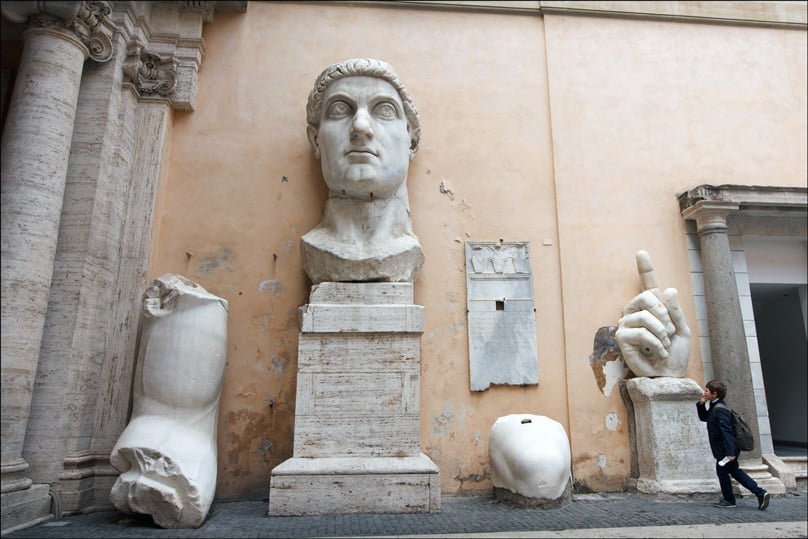
Last time in this space we noted that the Christian tradition reminds us that even unjust states, insofar as they administer just laws. So murder remains a crime even in Nero’s Rome and he has the right and duty to punish it.
Does that mean we just have to take it on the chin from tyrants? Well, yes and no. The response of the Christian tradition has developed over time. In the New Testament, there is a shocking emphasis on non-violence in response to grave injustice. From Jesus’ counsel to turn the other cheek, to his rebuke of Peter’s sword in the Garden of Gethsemane to Peter’s own counsel to his persecuted flock that they should die well and without sin, the response of the early Church to the murderous hatred of their neighbours was frequently martyrdom. Christians were largely pacifists in the early Church, seeing no particular reason why they should join the pagan army whose job so frequently involved killing them. They saw themselves as having “no lasting city” (Heb 13:14) here and their citizenship as being in heaven, not on earth.
But as the empire became Christian the interests of the Church and the state became entwined. This was not mere cynical compromise with power. As Israel had experienced under good kings like David or Hezekiah, the Church began to consider the possibility that a state might be so ordered as to make it easier to be a virtuous disciple of Christ. This was a possibility that had simply never been available before. And so Christian political theory began to develop as the Church moved more and more in a world where the tantalising possibility of a “City of God” might be approximated, while she was also perpetually stymied by the reality of human sin and the fact that Christ’s kingdom is not of this world. As a result, the thought began to occur to Christians that defending such a state might, in fact, be defending the least of these who were protected by the state from Huns, Visigoths, Norsemen, and sundry bringers of violence. So the idea of “just war” – and its corollary, just rebellion against a tyrant – began to be considered by Catholic political theorists.
We still live in that reality of a state that sometimes agrees with and sometimes makes war on the gospel. So we strive to do justice, love kindness, and walk humbly with our God (cf. Micah 6:8), but we do so aware that anybody who promises to establish the kingdom on earth before the coming of Christ is a fraud and a liar.
Indeed, one of the great cautions the Church gives us, for all its optimism about the possibility of us doing good things through a state ordered in a healthy way toward the common good, is the warning of trusting in any state or charismatic political figure promising utopia:
675 Before Christ’s second coming the Church must pass through a final trial that will shake the faith of many believers. The persecution that accompanies her pilgrimage on earth will unveil the “mystery of iniquity” in the form of a religious deception offering men an apparent solution to their problems at the price of apostasy from the truth. The supreme religious deception is that of the Antichrist, a pseudo-messianism by which man glorifies himself in place of God and of his Messiah come in the flesh.
676 The Antichrist’s deception already begins to take shape in the world every time the claim is made to realise within history that messianic hope which can only be realised beyond history through the eschatological judgment. The Church has rejected even modified forms of this falsification of the kingdom to come under the name of millenarianism, especially the “intrinsically perverse” political form of a secular messianism.
The point of this warning is not to fuel some Left Behindesque speculation about Whether the Antichrist Walks Among Us. It’s to point out that when Antichrist comes, he will sound like all the other antichrists we’ve seen for 2000 years: the guy who promises to give you earthly power and heaven right here and now if only you will cut corners on the Faith. That song and dance is so old it has whiskers on it. But people fall for it every time somebody comes along and tells us we can have money, pleasure, power, and honour for the low, low price of forsaking the teaching of Jesus Christ in his Holy Church. The moment the state, or the Dear Leader tell you that lie is the moment the Faith reminds us of the words of the apostles: “We must obey God rather than men” (Acts 5:29). If Caesar won’t bow to that, we must pray for the grace to suffer and, if need be, die as St Thomas More did: “The king’s good servant, but God’s first.”
